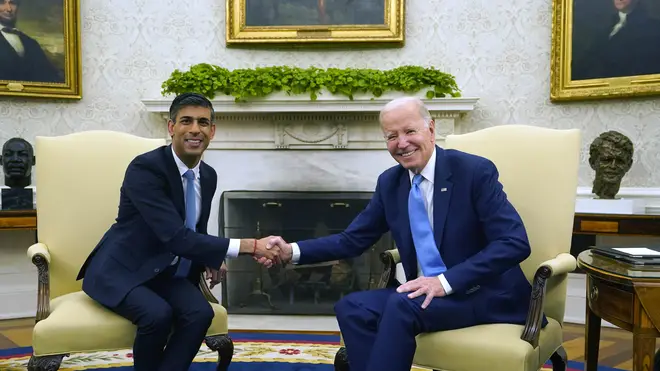
Richard Spurr 1am - 4am
8 June 2023, 21:24

Rishi Sunak met Joe Biden for talks in the White House on issues including artificial intelligence, Ukraine and economic co-operation.
Rishi Sunak and Joe Biden have agreed a new partnership to bolster economic security in response to China’s growing influence, with the Prime Minister calling the UK-US relationship the “indispensable alliance”.
The Atlantic Declaration, announced as the Prime Minister and US president met in the White House, includes commitments on easing trade barriers, closer defence industry ties and a data protection deal.
The agreement comes after hopes of a full-blown free trade deal were abandoned, with UK officials insisting the new, targeted approach was a better response to the economic challenges posed by Beijing and Russia’s invasion of Ukraine.
The Prime Minister said: “The UK and US have always pushed the boundaries of what two countries can achieve together.

“Over generations we have fought alongside one another, shared intelligence we don’t share with anyone else, and built the strongest investment relationship in world history.
“So it’s natural that, when faced with the greatest transformation in our economies since the industrial revolution, we would look to each other to build a stronger economic future together.
“The Atlantic Declaration sets a new standard for economic co-operation, propelling our economies into the future so we can protect our people, create jobs and grow our economies together.”
At a joint press conference with Mr Sunak, the president said: “It’s a testament to the depth, breadth and I would argue the intensity of our co-operation and coordination which continues to exist between the United Kingdom and the United States.
“There’s no issue of global importance – none – that our nations are not leading together.”
The deal mitigates some of the issues cause by Mr Biden’s Inflation Reduction Act (IRA), with proposals for a critical minerals agreement to remove barriers which affected trade in electric vehicle batteries.
An agreement would give buyers of vehicles made using critical minerals processed, recycled or mined by UK companies access to tax credits in line with the IRA.

The Inflation Reduction Act provides a 3,750 dollars incentive for each vehicle, on conditions including that the critical minerals used in its production – principally used in the battery – are sourced from the US or a country with whom the US has a critical minerals agreement.
An agreement could help companies all over the UK, including firms carrying out nickel production in Wales and lithium processing in Teesside.
Mr Biden has committed to ask Congress to approve the UK as a “domestic source” under US defence procurement laws, allowing for greater American investment in British firms.
Work will be carried out to improve the resilience of supply chains and efforts will be stepped up to shut Vladimir Putin’s Russia out of the global civil nuclear market.
The agreement will also include a push for mutual recognition of qualifications for engineers, although this could require state-by-state approval in the US.
A deal on data protection will ease burdens for small firms doing transatlantic trade, potentially saving £92 million.
The two nations will also collaborate on key industries – artificial intelligence, 5G and 6G telecoms, quantum computing, semiconductors and engineering biology.

It also commits the UK and US to partnership across all forms of space activity, including on communications and space nuclear power and propulsion.
The declaration states that: “Technology, economics, and national security are more deeply intertwined than ever before.
“We face new challenges to international stability – from authoritarian states such as Russia and the People’s Republic of China; disruptive technologies; non-state actors; and transnational challenges like climate change.”
Officials believe the deal is a less sentimental and more pragmatic approach to the UK-US “special relationship”, based on the need to ensure the allies can maintain their economic power and security.
The global energy shock caused by Russia’s invasion of Ukraine illustrated the vulnerability of major economies reliant on supply chains beyond their political allies.
There are fears that a Chinese invasion of Taiwan could cause a similar economic meltdown due to the disputed territory’s significance in global semiconductor supplies.
The new UK-US declaration is the latest sign that the globalisation of recent decades is being replaced by an era of trading alliances of like-minded nations.
Meeting Mr Sunak in the Oval Office, Mr Biden – who inadvertently referred to the Prime Minister as “Mr President” said the special relationship was in “real good shape”.
“Together we are providing economic and humanitarian aid and security systems to Ukraine in their fight against a brutal invasion from Russia,” Mr Biden said.

“The global economy is undergoing the greatest transformation that has occurred since the industrial revolution,” he added.
The president told Mr Sunak: “We’re going solve all the problems of the world in the next 20 minutes.”
In reference to Winston Churchill’s wartime visit to the White House, Mr Sunak said: “It’s daunting to think of the conversations that our predecessors had in this room when they had to speak of wars that they fought together, peace won together, incredible change in the lives of our citizens.
“And again, for the first time in over half a century, we face a war on the European continent.
“And as we’ve done before, the US and the UK, have stood together to support Ukraine and stand up for the values of democracy and freedom and make sure that they prevail, as I know we will.
“But also I completely agree with what you said, our economies are seeing, perhaps the biggest transformation since the Industrial Revolution, as new technologies provide incredible opportunities, but also give our adversaries more tools for harm.”
Before their meeting, Mr Sunak announced the UK will host the first global summit on AI safety.
The summit, which will be held in the autumn, will consider the need for international co-ordinated action to mitigate the risks of the emerging technology.